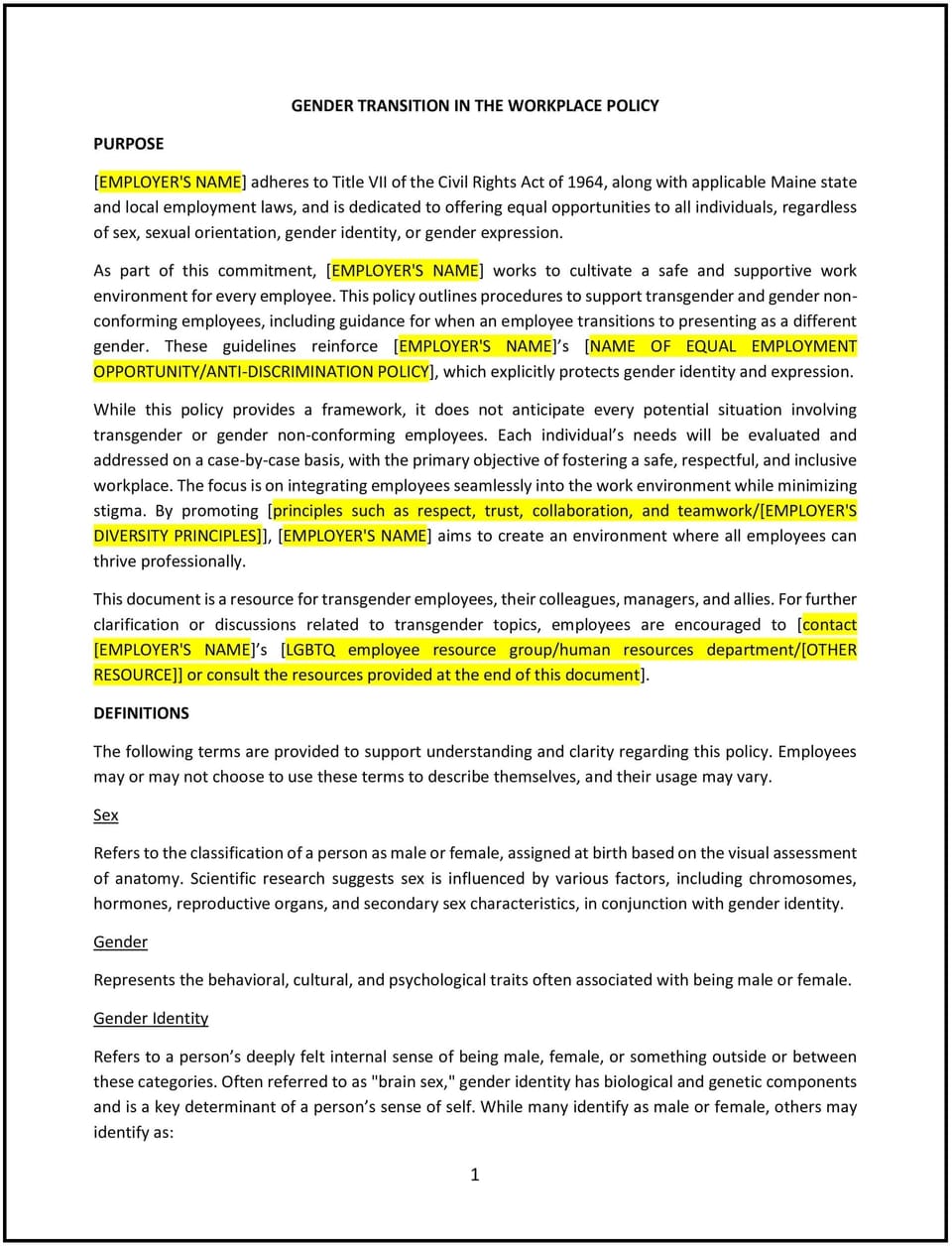Gender transition in the workplace policy (Maine): Free template

Gender transition in the workplace policy (Maine): Free template
This gender transition in the workplace policy is designed to help Maine businesses create a supportive environment for employees undergoing a gender transition. It outlines procedures for communication, workplace accommodations, and anti-discrimination protections, ensuring inclusivity and supporting compliance with Maine and federal laws.
By implementing this policy, Maine businesses can promote respect, foster inclusivity, and ensure employees feel supported during their transition.
How to use this gender transition in the workplace policy (Maine)
- Define purpose and scope: Clearly state the policy’s objective to support transitioning employees and foster an inclusive workplace.
- Include anti-discrimination protections: Reaffirm the business’s commitment to prohibiting discrimination and harassment based on gender identity or expression.
- Outline the transition process: Provide steps for employees to communicate their transition plans, including how to inform managers, HR, and colleagues if desired.
- Offer workplace accommodations: Detail accommodations, such as updates to records, restroom and facility access, and dress code flexibility.
- Address confidentiality: Ensure that all personal information related to an employee’s transition is handled with strict confidentiality.
- Provide training and resources: Include plans for educating employees and managers about gender identity, inclusivity, and respect in the workplace.
- Review regularly: Update the policy as necessary to reflect changes in Maine laws, workplace practices, or employee needs.
Benefits of using this gender transition in the workplace policy (Maine)
Implementing this policy provides several benefits for Maine businesses:
- Promotes inclusivity: Fosters a supportive and respectful workplace environment for all employees.
- Ensures compliance: Aligns with Maine Human Rights Act and federal anti-discrimination laws.
- Enhances employee well-being: Demonstrates support for employees undergoing gender transition, improving morale and retention.
- Reduces workplace conflict: Provides clear guidelines to address concerns or questions, minimizing misunderstandings.
- Builds a positive culture: Reinforces the business’s commitment to diversity and inclusion.
Tips for using this gender transition in the workplace policy (Maine)
- Communicate openly: Encourage respectful and supportive conversations while maintaining the employee’s privacy.
- Train managers: Provide managers with training on supporting transitioning employees and addressing workplace concerns.
- Use inclusive language: Ensure all workplace documents, systems, and communications reflect respect for gender diversity.
- Monitor implementation: Regularly review how the policy is applied and address any gaps or issues.
- Support employee choices: Allow employees to decide how and when to share their transition plans with colleagues.
- Stay informed: Monitor changes in Maine and federal laws to keep the policy compliant and relevant.
Q: What is the purpose of a gender transition in the workplace policy?
A: The policy ensures transitioning employees are supported and treated with respect while maintaining compliance with anti-discrimination laws.
Q: How can businesses support transitioning employees?
A: Businesses can provide accommodations, update employee records, offer training, and foster open communication while respecting privacy.
Q: How often should businesses review their gender transition policy?
A: Businesses should review the policy annually or whenever there are changes in Maine laws or workplace dynamics.
Q: What accommodations should businesses offer transitioning employees?
A: Accommodations may include restroom access, updates to identification documents, flexible dress codes, and scheduling adjustments if needed.
Q: How can businesses ensure privacy for transitioning employees?
A: Businesses should handle all personal information confidentially and only share details with authorized personnel on a need-to-know basis.
Q: What training should businesses provide to support this policy?
A: Training should cover gender identity awareness, inclusivity, respectful communication, and compliance with anti-discrimination laws.
Q: How can businesses address concerns from other employees?
A: Businesses should provide education and facilitate respectful discussions, emphasizing inclusivity and the company’s commitment to a supportive workplace.
This article contains general legal information and does not contain legal advice. Cobrief is not a law firm or a substitute for an attorney or law firm. The law is complex and changes often. For legal advice, please ask a lawyer.


